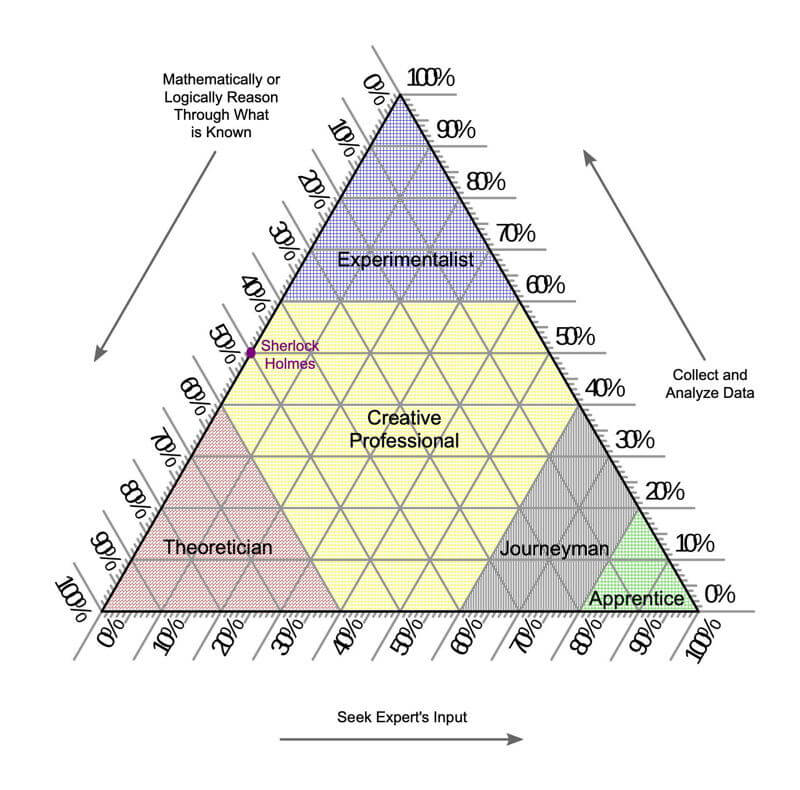How Do You Ask Questions?
Questions require action – both from the person creating it and those responding to it – including yourself. Explore how you develop and respond to your self-directed queries with the following web app. If you prefer a paper copy, use the pdf of the survey.
Click the button to run the web app.
None of your responses are collected or stored by the web app. All it does is provide an efficient way to take the questionnaire and save the results to your computer.
If you complete the survey multiple times, such as at the beginning and end of a school year, you may see how your teachers, courses, and experiences have influenced your questioning abilities.
Sabrina Sadique and John Pickle (now Jodi), teaching colleagues, talk about the stages a learner goes through to recognize and then begin to deal with confusion and how we, as teachers, can help them through their confusion. Several questions in the survey deal with how you process your confusion (#8-10).
Apologies for the Zoom delays in the video due to WiFi issues, but the message still comes through, just with some out-of-sync soundtrack in the video at times.
Acknowledgments
I would like to thank Miranda Brown, Mattea Horne, and Sabrina Sadique for their invaluable insights and discussions about the importance of questioning in our learning process. Their input has been so important throughout the development and modification of this questionnaire.
How Do You Tend to Answer Your Questions?
You collect and analyze data.
o—-o—-o—-o—-o—-o—-o—-o—-o—-o—- o
0% 50% 100%
Never Sometimes Always
You seek input from an expert, which includes using materials created by an expert.
o—-o—-o—-o—-o—-o—-o—-o—-o—-o—- o
0% 50% 100%
Never Sometimes Always
You reason through what you know.
o—-o—-o—-o—-o—-o—-o—-o—-o—-o—- o
0% 50% 100%
Never Sometimes Always
Categories of Questioners
Based on how you answered the three questions above, see what category of questioner you are.
Sum the values of your three answers. For example, if you answered 10% on collecting and analyzing data, 90% for seeking the input from an expert, and 30% for reasoning through what you know, the total is 130%. Use this to create percentages of each:
10/130 = 8% for collecting and analyzing data
90/130 = 69% for seeking the input of experts
30/130 = 23% for reasoning through what you know
Notice that these three percentages add to 100%.
Use these to plot on the ternary diagram on the right. Plot the position of three values that add to 100% on an equilateral triangle. The position for the above data would be located just below the “r” in Journeyman.

Categories of careers based on how you tend to answer questions. If you’ve read or watched any of the adventures of Sherlock Holmes, he never asks others for their input as he reasons and experiments his way to finding the villain.
Who is a Creative Professional?
If your peers and organization use your ideas and questions to improve the performance of the company, then you are a creative professional. Ultimately, it comes down to who you work with and for whom. If your input is welcomed and encouraged, you are a creative professional.
The Questioning Questionnaire
Before using the web app or the pdf, here are the 20 questions in the survey.
1) I ask questions.
Never | Rarely | Sometimes | Frequently | Always
2) I ask questions in a small group.
Never | Rarely | Sometimes | Frequently | Always
3) I ask myself questions.
Never | Rarely | Sometimes | Frequently | Always
4) Questions arise from what I know.
Never | Rarely | Sometimes | Frequently | Always
5) My questions lead to more questions.
Never | Rarely | Sometimes | Frequently | Always
6) I ask open-ended questions that require my full knowledge to answer.
Never | Rarely | Sometimes | Frequently | Always
7) I create more focused questions to explore my open-ended questions.
Never | Rarely | Sometimes | Frequently | Always
8) I am able to identify the cause of my confusion.
Never | Rarely | Sometimes | Frequently | Always
9) I am able to articulate (put to words) the cause of my confusion.
Never | Rarely | Sometimes | Frequently | Always
10) I am able to develop questions to work through my confusion.
Never | Rarely | Sometimes | Frequently | Always
11) I explore what I don’t know.
Never | Rarely | Sometimes | Frequently | Always
12) I explore how I ask questions.
Never | Rarely | Sometimes | Frequently | Always
13) I answer my questions by relying on experts and their resources.
Never | Rarely | Sometimes | Frequently | Always
14) How much do experts know?
Slightly More than Me | More than Me | Much More than Me | Nearly Everything | Everything
15) I answer my questions by reasoning through what I already know.
Never | Rarely | Sometimes | Frequently | Always
16) I answer my questions by collecting and analyzing data.
Never | Rarely | Sometimes | Frequently | Always
17) How do you decide if your question is answered completely and correctly?
Short answer/essay
18) What are your favorite topics to study? Your favorite hobbies? What has helped you grow in these areas?
Short answer/essay
19) How has asking questions been helpful in your life?
Short answer/essay
20) What experiences have you had that shed light on your responses in this questionnaire?
Short answer/essay

0 Comments